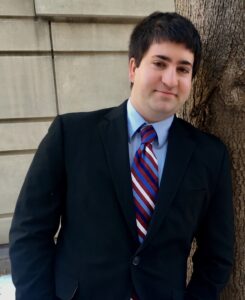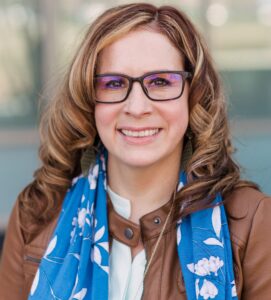One Faculty Fellow is appointed from each of the three colleges; CAHSS, CNMS and COEIT and serve a two-year term. Nominations are sought from faculty who exemplify the entrepreneurial mindset inside and outside the classroom and who are recognized champions of entrepreneurship initiatives on the UMBC campus.
Dr. Michael Andrews CAHSS
Email mandrews@umbc.edu
Phone 443-812-4538
Education Ph.D., Economics, The University of Iowa
B.A. Economics, University of Maryland
About
Dr. Andrews is an assistant professor in the economics department. His research and teaching focus on the economics of innovation and entrepreneurship, as well as economic history. He is co-editor of The Role of Innovation and Entrepreneurship in Economic Growth (University of Chicago Press, 2022).
To read more about Dr. Andrews, click on the link here.
Dr. Jamie Gurganus
Email jgurganus@umbc.edu
Phone 410-455-8439
Education Ph.D., Mechanical Engineering, UMBC
M.S. Mechanical Engineering, UMBC
About
Dr. Jamie Gurganus is an Assistant Teaching Professor in Engineering and Computing Education at UMBC and Director of the Center for the Integration of Research, Teaching and Learning (CIRTL). Her work spans P–12 through postgraduate education, advancing engineering identity, global and entrepreneurial competencies, and authentic learning practices such as gamification and hands-on design. Internationally recognized for leadership and mentorship, she has developed curricula, published widely, and co-founded initiatives that foster innovation and entrepreneurial mindsets in engineering education.
She is also the Principal Investigator for the inaugural Baltimore Innovation Initiative (BII) TEDCO initiative to create Entrepreneurial Learning Lab with the Alex Brown Center.
Recent Relevant Publications
J. Gurganus, Y. Brijmohan, et al, “Cultivating Empathy and Transformative Learning through Global Engineering and Social Entrepreneurship Education” Daegu, Republic of Korea, WEEF 2025.
Gurganus, J. et al; COIL Multidisciplinary Global Engineering Capstone Class Impact: Faculty and Student Insights Across Four Countries ASEE annual, Montreal, Quebec 2025.
J.R. Gurganus, M. M. Malschützky, S. McAlpine., Gurganus, J. R., McAlpine, S., & Malschützky, M. M. Evaluating Social Entrepreneurship Competencies and Global Perspective in an Entrepreneurship Course. 2024; WEEF-GEDC. Sydney, Australia.
J.Bansal, J. Gurganus, C. Lucas, M.Nitz, “Creating Quality Learning Experiences.” Inclusion of inter- and multi-disciplinary experiences through the adoption of experiential learning in undergraduate engineering. Advancing Leadership in Engineering Education. Springer International, 2024 (Corresponding author)
Dr. Stephen Miller CNMS
Email stmiller@umbc.edu
Phone 410-455-3381
Education Ph.D., Biology, Massachusetts Institute of Technology
B.S., Chemistry, Case Western Reserve University
About
Dr. Miller is Professor and Graduate Program Director in the Department of Biological Sciences. His lab at UMBC uses green algae to investigate the molecular genetic origins of developmental mechanisms such as cell differentiation, while also pursuing applied research to enhance algae as a platform for biotechnology. He teaches core Biology courses including Introductory Biology and Genetics, and an upper-level undergraduate/graduate course on Molecular Genetics that focuses on the mechanisms and applications of RNA interference and CRISPR.
To read more about Dr. Miller, click on the link here.


